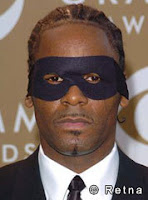
Last night I saw David Lynch speak at the Union Square Barnes & Noble in Manhattan, promoting his new book,
Catching the Big Fish: Meditation, Consciousness, and Creativity. The place was so packed with all manner of film nerd and superfan -- literally hundreds lining up two hours before he appeared -- it was like the Dalai Lama had come to town. He did a Q&A interspersed with the snyth pop of a Twiggyesque all-girl threesome called
Au Revoir Simone who make a kind of Stereolab-for-Dummys sound. After seeing Lynch's mindboggling, self-indulgent and totally riveting new film,
INLAND EMPIRE, it's hard to connect the director of a picture where Laura Dern pukes blood on Hollywood Boulevard for 10 minutes straight to this placid guru promoting world peace through meditative connection to the "Unified Field" of consciousness. But with his big silver pompadour and friendly midwestern accent, he just smiled and innocently talked about ideas being "fish" and how TM allows him to go "deep" to find the really big, beautiful "fish" swimming way down inside the sea of his mind. Here's a short video I shot on my cell phone that gives you a taste of his wonderfully weird manner. (The last word that's cut off at the end is "beautiful.")
David Lynch on "the deeper level" (Quicktime)And this is from the audio version of Lynch's new book:
David Lynch - The First Dive
This got me to doing some fishing of my own, in my iTunes, for songs that I'm currently obsessed with. I realized that the connection between them was that they'll sound really marvelous if played loud, loud, loud in your car stereo tonight while cruising around with your friends. An underlying theme seems to be the blending of old and new, or everything that's old is new again or vice versa. It's all part of the search for something. The great, lost hidden thing out on the streets that all of Springsteen's people were looking for. The big fish. This idea started the other night when I myself was cruising the streets of Brooklyn and pumping some R. Kelly in the Corolla. I decided, as I have many times before, that R. Kelly is a genius for our time and the album
Happy People is definitely from way deep down in the Unified Field.
Love Signals - R. Kelly
Speaking of movies and music, the new musical
Dreamgirls is, despite my reservations and skepticism, a beautiful, lush and enveloping picture. And despite what A.O. Scott says, the music is actually wonderful, even if not historically accurate. If Jennifer Hudson cuts an R&B record this year, you will definitely hear about it on this blog because she is a preternatural talent who is all Unified Field all the time. As you've no doubt heard, her signature song in the film, "And I Am Telling You I'm Not Going," just rips the roof off. Go see the movie. Meanwhile, this tune from the 60s R&B compilation
Looking for My Baby! (hat tip: Mr. Poncho) epitomizes that sound. Sheila Hutchinson's vocals, especially toward the end of this number, are sensationally ambitious for 60s girl pop, presaging Mariah Carey's ululations. The drums are great, too. I can imagine Harry Dean Stanton listening to this while cruising on a hot night, smoking, preparing to off somebody.
Somebody New - The EmotionsRegrets: I've had a few. One is not making Girl Talk's album
Night Ripper one of my Top Ten of '06. This illegal mashup music is like crack cocaine for your iPod. And when it's thumping your Chevelle this weekend you're going to write me an email and thank me, I guarantee. This one cuts James Taylor with rap beats and grunge riffs in a way that is gonna feel right when you're at the red light next to people who are otherwise cooler than you. The fun is identifying some of the samples.
Hold Up - Girl TalkToo Deep - Girl TalkContinuing the theme of old school/new school mashing, here's a cut from yesterday's
freebies on Pitchfork, a remix of Clipse's "Mr. Me Too" by somebody named Z.A.K. It's the extravagent use of Lee Field's "Honey Dove" that's gonna make you feel like you own the street. The guitar riff is velvety as velvety can be.
Mr. Me Too - Clipse (Z.A.K. remix)Bring it down. Ease up. Let it happen. A guy who knows something about the beauty of a well-recorded drum beat is one Jamie Lidell, the electronica
cum soul man who
I've pushed here before. In this case, the drum 'n bass on "Game for Fools" is so warm and sweet and analogue that the melody and singing are almost irrelevant. You can just groove on this groove, man. The singin' ain't bad though, no it is not.
Game for Fools - Jamie Lidell 
Boy, did those Pitchfork guys
go wild for Sally Shapiro, the conceptual Swedish techno-pop songstress. An eight-point-five out of 10! It's not hard to understand why. The indie-rock dweeb fantasia driving this overzealous star rating looks something like this: You're in a modernist igloo in a remote northern icescape somewhere far from the human race, a fire raging in the fireplace, laying on a bear rug with an innocent Swedish nymph who has a winsome gap in her teeth, speaks a coy and adorably broken English and doesn't blink much (basically
this gal). Then a synth beat starts and she starts singing
this to you. That's nerd heaven. I'm familiar with the genre. It's deep in the psyche, a particularly big fish that I think, based on the blonde-on-brunette lesbian sex scene in
Mulholland Drive, David Lynch is familiar with. My first introduction to it was Nena. I was in love with Nena, okay? I just was. Here are two non-"99 Luftballoons" tunes from the 1984 vinyl. Notice the flagrant Scorpians riffs they sneak in on this first one and the David Letterman sax solo in the second. (Note: Our Friday night cruising grows reflective and nostalgic during this set; we remember the good times before.)
Hanging on You - Nena? - Nena I only recently recalled the Olivia Tremor Control. What happened to them? They had something special happening. This song makes everyone feel good. Somebody runs in for some smokes at the 7-11 while this is playing. Perhaps a joint is prepared.
Hideaway - Olivia Tremor ControlAn epic Friday Night cruise ends in the early morning hours, when the light of dawn is just perceptible through the street lights, but only
just. Let me proclaim loud and clear for all the people to hear: Petra Haden is a phenomenal talent who should be famous. Why? For the sole reason that she recorded an
entirely a'cappella version of Michael Jackson's "Thriller" using her voice for every single instrument and beat (including, in fact, beat boxing).
You can hear it on her website and I encourage you - nay, insist! - that
you give it a listen. Her full-length all-a'cappella version of
The Who: Sell Out is by now well known, but this takes it to a new level. Meanwhile, here is the perfect soundtrack to dropping off your friends one by one at their doorsteps after a long evening of cruising, letting yourself go, letting it happen, letting the the streets open themselves up to you, groovin' on the ribbon, the white line, the street lights, the deeper down things and, always, ever, the beat.
God Only Knows - Petra Haden
 I've had this experience before: listening to Deerhoof and just shaking my head in pained /ecstatic disbelief. This band has transformative powers. The drummer is a god -- truly, comparable to John French, Keith Moon, Steve Gadd, Mitch Mitchell, Joey Barron. This is mighty, mighty music. Studied, joyous, cathartic, ape-shit insane music. The guitarist keep the Beefheart-isms pumping, with slashing, gnarly blasts worthy of Marc Ribot. And somehow singer Satomi Matsuzaki mixes the childlike cooing of Astrud Gilberto and the naive eccentric freestyling of Shonen Knife. All the while everything remains fierce, energetic, complex and yet somehow catchy.
I've had this experience before: listening to Deerhoof and just shaking my head in pained /ecstatic disbelief. This band has transformative powers. The drummer is a god -- truly, comparable to John French, Keith Moon, Steve Gadd, Mitch Mitchell, Joey Barron. This is mighty, mighty music. Studied, joyous, cathartic, ape-shit insane music. The guitarist keep the Beefheart-isms pumping, with slashing, gnarly blasts worthy of Marc Ribot. And somehow singer Satomi Matsuzaki mixes the childlike cooing of Astrud Gilberto and the naive eccentric freestyling of Shonen Knife. All the while everything remains fierce, energetic, complex and yet somehow catchy.


























